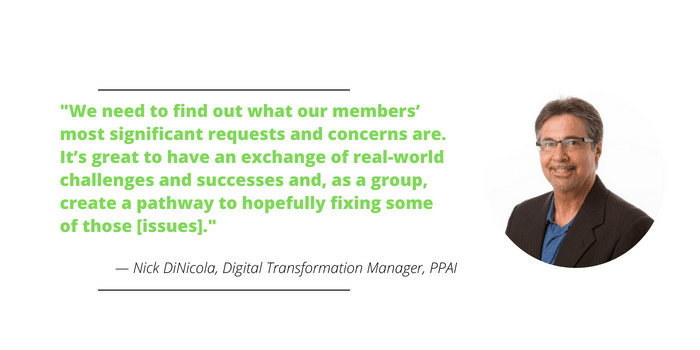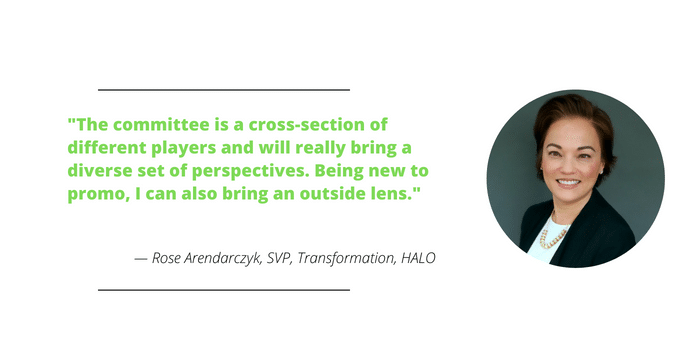PPAI has announced the members of its Technology Committee for 2023. Including industry tech experts from a nearly equal number of distributors and suppliers as well as service providers, the committee was formed with balance in mind. It is made up of representatives from small, medium and large companies.
The committee will identify industry problems and brainstorm viable solutions while enhancing Promo Data Exchange (PDX).
Why Does PPAI Need A Technology Committee?
Chris Anderson, CEO of HPG and the technology committee’s liaison to the PPAI Board of Directors, lays out the reason for the committee.
“The stated purpose of the PPAI technology committee is to advance the digital transformation of the industry,” Anderson says. “I can’t think of a more exciting – but also more important – initiative facing suppliers and distributors today, and I am excited to partner with this talented and knowledgeable group to take it on.”
Promo companies of all sizes are constantly looking for tech solutions to problems they face in their day-to-day operations.
- Most issues are shared problems that affect other distributors and suppliers.
“We need to find out what our members’ most significant requests and concerns are,” says Nick DiNicola, PPAI’s digital transformation manager. “It’s great to have an exchange of real-world challenges and successes and, as a group, create a pathway to hopefully fixing some of those [issues].”
- PPAI’s role is to serve the industry as a whole, identify solutions to issues and raise awareness of the solutions, as well as drive adoption where appropriate.
“Distributors and suppliers are dealing with the problems, not PPAI,” says PPAI President and CEO Dale Denham. “The organizations that are selling and producing know the issues and can craft the best solutions through collaboration. Our role is to bring them together and create the best value for the industry.”

Rose Arendarczyk, HALO’s SVP of transformation and the PPAI Technology Committee Chair, expects the conversations to initially be broad and big picture before eventually being narrowed down through discussion. She will bring an outside perspective to the group, having joined HALO in April of 2022 after over seven years of navigating tech solutions at Trustmark Companies, a national employee benefits company.
“I look forward to working together, engaging in robust discussion and aligning on solutions that will enable improvements to some of the common challenges we face in the industry,” Arendarczyk says. “The committee is a cross-section of different players and will really bring a diverse set of perspectives. Being new to promo, I can also bring an outside lens.”
- Technology solutions and possibilities are created specifically to meet promo demands, but in some large-scale cases, they will only truly be utilized to their full potential if collaborators across the industry are discovering and able to use them in their businesses.
“Technology is evolving very rapidly across the promotional products industry,” says Marc Sule, chief information officer at alphabroder Prime Line and member of the committee. “I am excited to be a part of the PPAI Tech Committee to advise on initiatives and industry trends.”
These trends, according to Taylor Tadmor, president of Tekweld and member of the committee, not only “shape the industry for years to come” but also will be a factor in determining the promo world’s place in an increasingly digital future.
“It is exciting to be part of a team that is working to ensure the industry remains competitive and relevant,” Tadmor says.
The Committee Members
PPAI put together the Technology Committee with an eye on balance between suppliers and distributors as well as size of companies, which shows in the committee roster, but DiNicola also points out that there are a variety of different kind of tech thinkers on the committee.
“Many of the people are highly technical and highly visionary,” DiNicola says. “I think that combination will lead us to a path to success even faster.”
PPAI hopes this mix will lead to an organic blend of technology knowledge and business knowledge, so that tech investment is deliberately targeted and immediately impactful. Many promo organizations already implement initiatives to lower the barrier of entry when it comes to technology for their clients. An industry-wide version of that can accomplish more than individual troubleshooting and, hopefully, create growth opportunities.
The list of members:
- Rose Arendarczyk, SVP of transformation, HALO (Committee Chair)
- Chris Anderson, CEO, HPG (Board Liaison)
- Nick DiNicola, digital transformation manager, PPAI (Staff Liaison)
- Joe Hoffmann, vice president of vendor management, iPROMOTEu
- Malik Hemani, creative director, branding & advertising, Graphic Stylus
- Ryan Feigenblatt, founder and president, The Boca Ratonian
- Todd Bold, chief operating officer, Americas at adm Group ltd.
- Andrea Kramer, president, City Apparel
- Taylor Tadmor, president, Tekweld
- Paul Hirsch, president, Hirsch
- Marc Sule, chief information officer, alphabroder Prime Line
- Jeison Ortega, chief technology officer, Charles River Apparel
- Matt Price, manager, information technology, Gold Bond
- Dustin Downing, chief product officer, OrderMyGear
- Jeremy Holley, vice president of technology, HPG
- Edward Streiff, senior manager application development, PCNA
- Shawn Reed, director of information technology, Showdown Displays
- Jarod Thorndike, VP of business development, SAGE
Together, these committee members make up some of the most technologically and business savvy companies in the promotional products industry.
“The caliber of the organizations on this committee is extremely impressive,” Denham says.

PDX Remains An Important Topic
PDX will be top of mind for the technology committee. PDX makes it easy for suppliers to share order status and inventory with distributors with a single integration which will eliminate thousands of hours of wasted effort. Eliminating friction and unnecessary phone calls are goals that most of the industry understands can make business much more efficient.
“I’ve been in the industry almost 30 years and we’re struggling with some things at this point that we shouldn’t be,” DiNicola says of the need for a universal set of standards.
Tadmor says it is fairly obvious to everyone that what PDX intends to accomplish will make the industry run more smoothly.
“From a tech standpoint, an open standards formula like PDX – combined with leveraging an established service provider with 45,000 users – does seem like a no-brainer,” says Tadmore. “Like many organizations, we support PDX and PromoStandards because they help us reach different organizations to reduce friction.”
How we get there has been a subject of debate within the industry, and PPAI wants the technology committee to foster these discussions, and even disagreements, about the necessity of PDX. PPAI has also leveraged its partnership with SAGE to make PDX more accessible, along with creating the ability within the SAGE app for distributors to see order statuses and inventory that suppliers supply live.
“The exciting part about PDX is that due to PPAI’s relationship with SAGE and their commitment to PDX, there is minimal additional work for most firms to benefit from PDX,” Denham says.
What the industry’s future holds for this particular area is not certain, but it’s clear that the conversations need to be happening in earnest, and the technology committee is a healthy place for that dialogue to occur.
“There have been multiple stabs at seamless supplier-distributor integration, some less successful than others, but no ‘perfect’ solution,” Anderson says. “Whether PDX proves to be the right solution for all distributors and suppliers very much remains to be seen. However, I am confident that it will drive additional thought, dialogue and collaboration around the topic of data exchange that will, no doubt, benefit the industry.”


